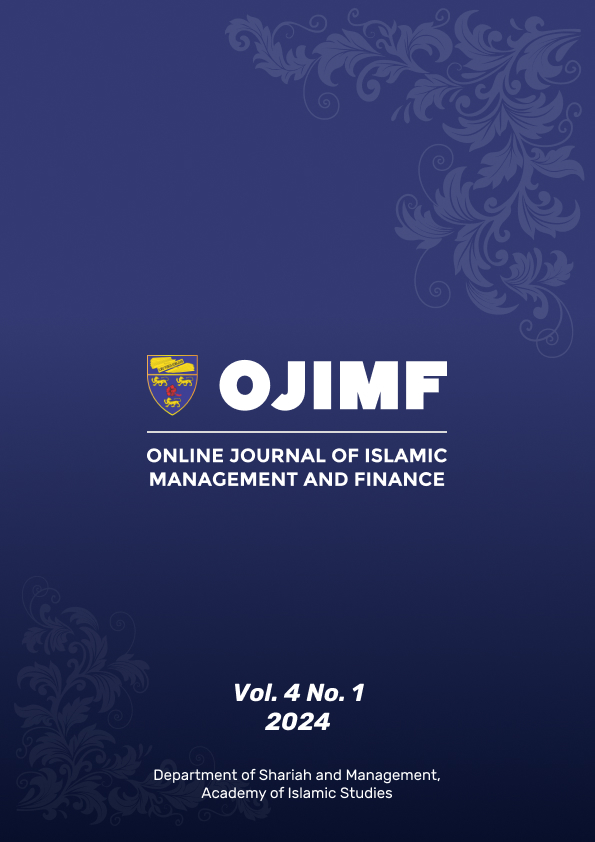أثر المساءلة من منظور إسلامي في أداء المعلمين بالمدارس الحكومية في سلطنة عمان بولاية بوشر من وجهة نظر مديري المدارس ومساعديهم THE IMPACT OF ACCOUNTABILITY FROM AN ISLAMIC PERSPECTIVE ON THE PERFORMANCE OF TEACHERS IN GOVERNMENT SCHOOLS IN THE SULTANATE OF OMAN, IN THE STATE OF BAUSHER, FROM THE POINT OF VIEW OF SCHOOL PRINCIPALS AND THEIR ASSISTANTS
Main Article Content
Abstract
This study aims to reveal the impact of accountability from an Islamic perspective on the performance of teachers in government schools in the Sultanate of Oman in the state of Bausher. And in their relations during the practice of the educational process, and the importance of the study lies in an attempt to shed light on the importance of knowing the impact of accountability from an Islamic perspective on the performance of teachers, and the researchers used a random sample consisting of (24) school principals and assistant principals in government schools in the state of Bausher, and they were chosen using the intentional sampling method, In the way it was prepared, this study relied on the analytical descriptive approach, and the researchers used the questionnaire as a tool for data collection, which consisted of the field of accountability from an Islamic perspective, and the field of teacher performance. The independent variable (accountability) included four dimensions: (discipline, achievement, professional ethics, human relations ), and to extract the results from the questionnaire, the extracted data were processed by using statistical packages for social sciences (SPSS), and the results of the study showed that there is a positive effect of accountability from an Islamic perspective in the performance of teachers from the point of view of school principals and their assistants according to its four dimensions, and the study recommended to instill the principle of accountability subjectivity based on the Islamic perspective, with the importance of linking the outcomes of accountability with reward and according to the Islamic perspective.
Downloads
Article Details
References
Abdel Moneim, N. & Ibrahim, K. (2001). Barriers to school administration performance in achieving the goals of general secondary education, Cairo: National Center for Educational Research.
Al Helwa, T. (2012). The role of mass media in promoting the value of responsibility among young people from an Islamic educational perspective. Journal of Education, 40:192, pp. 46-86.
Al-Hassan, M. (2010). Degrees of administrative accountability and effectiveness and their relationship among principals of public secondary schools and their departments in the West Bank governorates from the perspective of workers in education departments, Unpublished Master's Thesis, An-Najah University, Palestine.
Al-Maidani, Abdul Rahman (1999), Islamic ethics and its foundations. Fourth edition, Damascus: Dar Al-Qalam.
Al-Makki, A. (1305 AH). The great footnote called the Most Merciful talents on the demands of charity in matters of religion and people of faith. Cairo: al-Mataba' al-Khairiya.
Al-Nisaburi, A. (2006). Sahih Muslim, Volume (2). The Book of Remembrance, Supplication, Repentance and Asking for Forgiveness, Chapter: Unity in Qur'anic Recitation and Remembrance, Riyadh: Dar Taibah, p. 857.
Al-Otaibi, & Sharif, M. (2018). Human relations among school leaders in Taif governorate and their relationship with teachers' job performance. Scientific Journal, 34:11, pp. 231-262.
Al-Saadan, A. (2005). Work ethics and Appeals Board experience in supervision. A paper presented at a symposium on work ethics in the government and private sector, Institute of Public Administration, Kingdom of Saudi Arabia, Riyadh, 1/20/1426 AH.
Al-Saud, K & al-Tarawneh, K. (2012). The degree of implementation of smart accountability measures by school leaders that support the transformation of public schools into quality units from the point of view of school leaders, Scientific Journal of College of Education, 27:11, p. 466-489.
Al-Shakhout, F. & Zuhair, H. (2016). The Effectiveness of Administrative Accountability Among Secondary School Principals and Its Relationship with the Level of Job Performance of Teachers in Zarqa Governorate. Unpublished Master Thesis. Hashemite University, Zarqa. Retrieved from http://search.mandumah.com/Record/820177
Ammar, A & Khater, N. (2020). The reality of educational accountability and obstacles to its implementation in basic education schools in Buhaira Governorate from the point of view of its principal. Journal of the Faculty of Education. 123: 2, pp. 277-362.
Badran, U. (1981). Extending the Applicability of Ethical Judgment to Preparatory and Secondary Students in Jordan, Unpublished Master's Thesis, University of Jordan.
Bani Hamdan, S, & Bani Hamdan, I. (2021). The level of job performance of public secondary school teachers in Jerash Governorate from their point of view and its relationship with some variables, Islamic Journal for Educational and Psychological Studies, 5:29, pp. 419-432.
Dahman, Abdel Moneim. (2012). Islamic Principles in Performance Appraisal Processes, Islamic Transactions Jurisprudence Research Center, accessed 12-19-2021. https://kantakji.com/2295.
General Scottish Council for Education. (2021). The problem and evaluation of teacher performance. https://www.gtcs.org.uk/
Harir, R. (2012). Educational Calendar, Amman: Dar Al-Manhaj.
Ibn Khaldun, A. (1984). Introduction: The Modern Library, 2nd edition. Sidon, Beirut.
Khalifa, M. (2017). Administrative accountability and its impact on workplace performance, Scientific Journal of Commercial and Environmental Studies, 8:4, p. 618.
Madaus, G.F, (2000). Educational Accountability. ERIC, ED. 286550 Mathers, Judith and King, Richard A. (2001). Teachers Perception of Accountability. Paper Presented at the Annual Meeting of the American Educational Research Association Seattle, WA. (April Colorado, Eric - No: ED455212 (2017-4-17).
Merazga Hakima, ET. al. (2020). Online Journal of Research in Islamic Studies, 7:1, pp. 69-85.
Mohammad, R. (2001). Human Resource Management: A Future Vision, Cairo: Dar Al-Jamaia.
Morsi, A. Muhammad M. (2018). Islamic Rooting of Educational Accounting in the Light of the Holy Qur'an and Sunnah of the Prophet. Educational and Psychological Studies, 33:101, pp. 227-285.
Muhammad, T. A., & Tariq Abu Al-Wafa. (2021). The emergence of administrative control in Islam - monitoring workers and holding them accountable during the era of the Rightly Guided Caliphs as an example (11-40 AH / 632-661 AD). Nile Valley Journal for Human, Social and Educational Studies and Research, 32:32, pp. 615-652.

